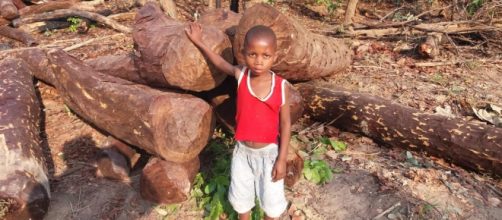It’s not every day that a press release from a Bishop of the Catholic Church lands on your desk. Moreover the content is catholic in the original meaning of the word. It concerns the earth upon which we all depend.
Monseigneur Fulgence Muteba, Bishop of Kilwa-Kasenga in the province of Katanga, writes about the desecration of Sister Earth in his part of the Democratic Republic of Congo (DRC).
Wounding the rose
Mukula (Pterocarpus chrysothrix) is a rare and slow growing tree whose precious red wood (rosewood) is in high demand on the international market.
Two years ago alarm bells were raised over the uncontrolled harvesting of the wood for export. Security was reportedly stepped up and controls were put in place. However, since then things have slipped back into lawlessness, reports the Bishop.
Along many routes in the south of the country the destruction is visible to all. At Sapwe (150 km from Lubumbashi); on the road between Minga-Kasomeo and Katendeji (378 km from Lubumbashi); on the road between Kilwa and Dikulushi as it passes Bowa (180 km from Lubumbashi); and on the road Kasomeno-Lupembe and Chez Aaron (180 km from Lubumbashi) there are piles of mukula logs awaiting transport.
It's apparent that the wood has been cut by axe rather than by power saw.
“This pillage is the work of the Chinese who are here officially to rehabilitate some of our existing roads. They employ local villagers, who are desperate for work, to cut the forests. The logs are moved at night in large trucks to a well known depot in Lubumbashi before they are smuggled into Tanzania via Zambia en route to China, ” Bishop Muteba explains.
No control
There is no control and therefore no legal oversight of the carnage. “There's absolutely no effort to replant or rehabilitate the wasteland that's left behind,” says Monseigneur Muteba.
The local populations watch helplessly at this violation of their land. Apart from the few villagers who are temporarily employed no-one gains.
Neither locals nor the public fiscus. All this is done with the complicit agreement of 'certain high Congolese officials'. “The Chinese act with impunity,” he says.
Climate change breach
This flies in the face of the the DRC's promises at COP 21 in Paris last year where it became the 55th country to submit its contribution to a planned global climate deal. The DRC committed to planting three million hectares of trees by 2025. Furthermore, it pledged to protect 152 million hectares still covered by vegetation, which, “places it in the unusual position of being a country that absorbs more CO2 than it produces”.
“In the context of the Encyclical Laudato I am launching a loud call to the public authorities and the population of the territories of the Kasenga and Pweto and to well meaning people to take measures to stop the spoiling of our heritage and protect our precious forests and safe guard the ecosystem for the common good and particularly for mitigating climate change,” says Monseigneur Muteba.
Hurting the earth is a sin
The Laudato si is a document published by the Vatican in May 2015 and is addressed to all people of goodwill. Covering a wide range of subjects Pope Francis issues a strong call-to-action for humanity to reconnect with nature on a mature and respectful level. It's well worth the read, and for those who feel that humanity's transformation requires a spiritual shift, it articulates why hurting the earth is a sin against ourselves, especially the poor.
“We must forcefully reject the notion that our being created in God’s image and given dominion over the earth justifies absolute domination over other creatures. It is a sin to attack nature, ” says the Laudato.
From the largest church of the largest religion in the world these are powerful words. Let us hope that humanity is listening. We won't get a second chance .

